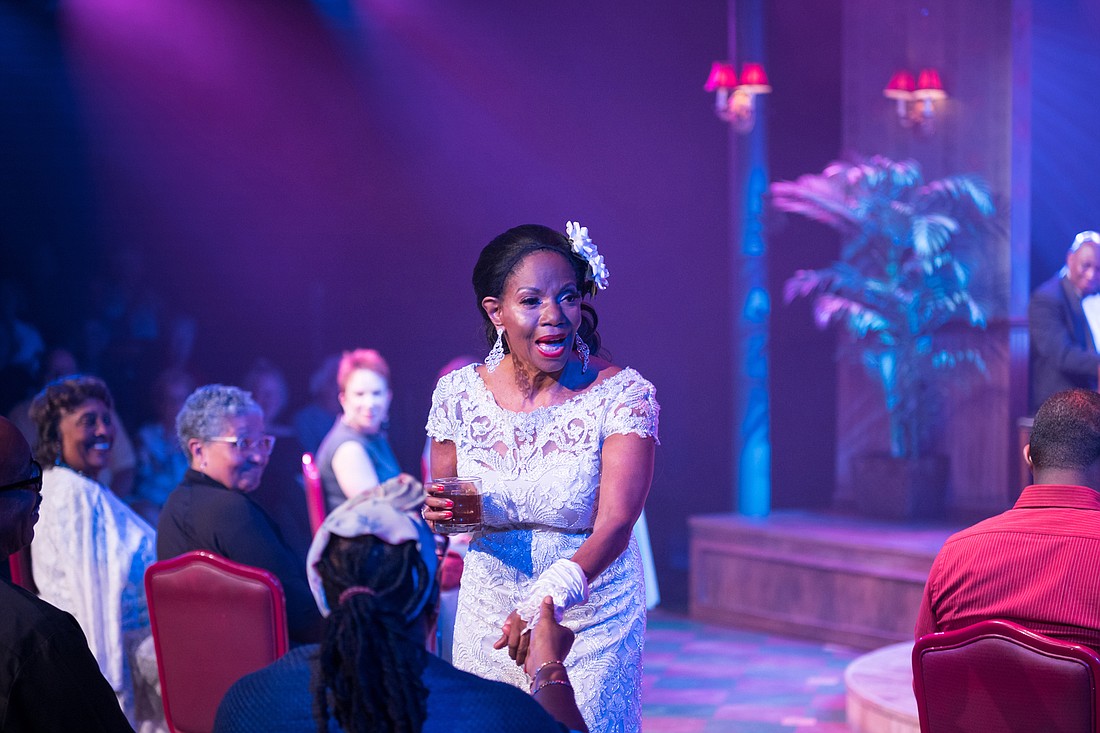- February 22, 2026
-
-
Loading

Loading

Melba Moore is a Tony Award-winning actress and a critically acclaimed R&B singer. She’s celebrated the legacy of Billie Holiday throughout her career, and even devoted an entire album to Holiday’s songs. Now that celebration continues on the Westcoast Black Theatre Troupe stage. Moore is currently portraying Billie Holiday in Lanie Robertson’s “Lady Day at Emerson’s Bar and Grill,” a heartbreaking reimagining of one of Holiday’s last performances. For Moore, the role is bittersweet. It’s a tribute to “Lady Day” — and a reminder of her tragically short life. In a recent conversation, Moore shared why the songs and spirit of Billie Holiday mean so much to her.
I think Lanie portrays Billie as an amazing combination of vulnerability and innate strength. There’s an immediate and apparent contradiction of who she is in the play. Billie has a great joy in life, despite the fact that she’s been so victimized. Billie will be singing, then she’ll suddenly start talking. She’ll be rambling as anyone who’s high rambles. You can see her terrible addiction, but you also see the strength.
I approach Billie Holiday with profound respect. I’m so much in awe of her accomplishments as a singer, and the fact that she even learned to sing in the first place! Billie was just a regular person with no formal music training.
Billie taught herself. She’d listen to records as a kid. She’d be singing, singing, singing, and try to copy what she heard. That was her version of Juilliard. As a singer, I can’t really capture Billie’s expression — that’s her unique gift and I’m not a mimic. I do try to capture Billie’s spirit to the best of my ability. As an actor, I strive to be an interpreter, not an imitator. I strive to be true to the heart of who she was. As a person, I can truly relate to her. We share so many, many things in common.
Well … If you’re black, female and of a certain age, you share a similar cultural upbringing — especially if you grew up in the South. Faith is a very important part. First of all, I’m Catholic. Many Caucasians think that all black people are either Pentecostals or Baptists, but that’s a misconception. African-Americans have a strong Catholic community, not only in New Orleans, but also throughout the South. Our shared heritage also includes the legacy of slavery and racism. Certain vulnerabilities and victimizations flow from that history. It’s a sad thing to share, because we never ever should have been slaves. The legacy of that oppression has led to many broken families and absent fathers. Billie and I shared that experience as well. In my own life, my mother was a singer, and often on the road. My father was gone. When there’s no father around, there’s no protection. So every form of abuse will happen — verbal and sexual. Billie was raped at 10, and I can say I shared a similar experience. For black women of a certain age, it’s a common occurrence.
Faith. My mother put me in Catholic school. I was baptized, christened and received the Holy Spirit. Billie was brought up in brothels because her mom was too young to know. Who knows what directions our lives would take if our situations were reversed? There, but for the grace of God, go I. And grace is what it’s all about — it informs my whole approach to Billie’s character.
As a devoted Catholic, I was initially concerned about Billie’s use of profanity. But Jesus allows us to see beyond the worldly surface. With the eyes of faith, you can see into Billie’s life in a deeper way. She was so full of life — she was larger than life. Her personality was a multiplicity of pathos, joy and boisterousness. That’s what people want to see, and it’s my job to bring that forth. Telling Billie’s story is the only reason I wanted to do this play.
Absolutely, and I do, as well. As a Catholic, I realize that God says there will be no drug users, dealers, or adulterers in heaven. I also understand that when Billie died she wasn’t on drugs anymore. I believe in the deeper mercies. Catholics believe in purgatory, so if you didn’t get it quite right here, you still have an opportunity to experience God’s mercy after death. It’s not for me to know Billie’s fate in the next world. I do know that she continues to be really loved and appreciated down here on earth.
It’s a great story, but I’m not sure how much is my memory of what happened and how much is my memory of Nate telling the story.
OK. Well … I was going to see “Jelly’s Last Jam” on Broadway to encourage my friend Ben Vereen, who was just returning to the stage after an accident. Nate didn’t have a ticket, but he went around the rope line and snuck down the red carpet to meet me. Nate introduced himself, and it turned out, we had a mutual friend. He was real nervous. (laughs) He kept saying “I’m trying to … I’m trying to …” After he calmed down, he talked about the African-American theater troupe that he wanted to start. We made a connection, and I gave him my phone number. As Nate continued to try to raise funds for his theater, he called me down to do some fundraising. I was happy to help.
Yes, he does. And he’s a completely genuine personality. If you spend a lot of time with Nate, as I have, you see he is what he seems to be.
Nate’s directorial style is very gentle and respectful. He doesn’t boss you around; he’s open to your ideas; he draws you out if something’s not working right. We’re kindred spirits. Working with him is so easy. I feel like a spoiled brat.